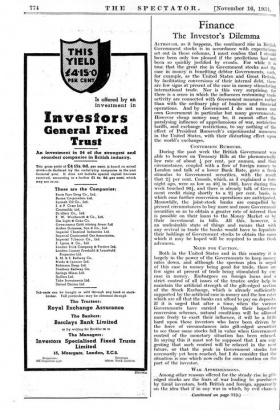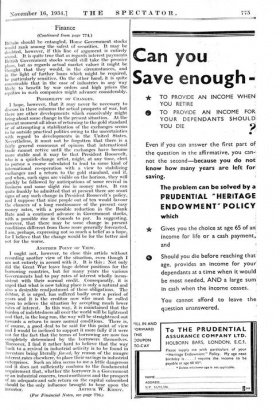. Finance
The Investor's Dilemma
ALTHOUGH, as it happens, the continued rise in British Government stocks is in accordance with expectations set out in these columns, I must confess that I should have been only too pleased if the predictions had not been so quickly justified by events. For while it is true that the great rise in Government stocks and the ease in money is benefiting, debtor Governments, such, for example, as the United States and Great Britain, by facilitating conversions of their internal debt, there are few signs at present of the ease in money stimulating international trade. Nor is this very surprising, for there is a sense in which the influences restraining trade activity are • connected with Governmeht measures rather than with the ordinary play of business and financial operations. And by Government I do not mean our own Government in particular but many governments. However cheap money may be, it cannot offset the paralysing. influence of apprehensions of war, restrictive tariffs, and exchange restrictions, to say nothing of the effect of President Roosevelt's experimental measures in the United States, with their disturbing effect upon the world's exchanges.
CONVERSION RUMOURS.
During the past week the British Government was able to borrow on Treasury Bills at the phenomenally low rate .of about per cent. per annum, and that circumstance, coupled with a flow of foreign money to London and talk of a lower Bank Rate, gave a fresh stimulus to Government securities, with the result that 2i per cent. Consols, which, as I explained a fort- night ago, were as low as 49i in 1981, have during this week touched 901, and there is already talk of Govern- ment credit rising shortly to a 2i per cent, basis, in which case further conversion operations are anticipated. Meanwhile, the joint-stock banks are compelled by present circumstances to buy more and more Government securities so as to obtain a greater rate of interest than is possible on their loans to the Money Market or by their investment in bills. All this, however, is an undesirable state of things and means that with any revival in trade the banks would have to liquidate their holdings of Government stocks to obtain the sums which it may be hoped will be required to make fresh advances.
NEED FOR CAUTION. -
Both in the United States and in this country it is largely in the power of the Governments to keep money rates down, and although the specious plea is urged of this ease in money being good for trade, there are few signs at present of trade being stimulated by any ease in money. Embargoes on foreign loans and a strict control of all issues of the trustee order help to maintain the artificial strength of the gilt-edged section of the Stock Exchange, which is already sufficiently supported by the artificial ease in money and the low rates which are all that the banks can afford to pay on deposits. If it is urged that after a time, when the various Governments have carried through their hoped-for conversion schemes, natural conditions will be allowed more freely to exert their influence, it will be a little hard upon those investors who have been driven by the force of circumstances into gilt-edged securities to see those same stocks fall in value when Government control of the monetary situation has been relaxed. In saying this it must not be supposed that I am sug- gesting ' that such control will be relaxed in the near future, or that the peak in Government _ stocks has necessarily yet been reached, but I do consider that the situation is one which' now calls for some-caution on the part of the investor. '
- WAR APPREHENSIONS.
Among.other reasons offered for-the steady-rise in gilt- edged stocks are the feais of war leading to purchases by timid investors, both British and foreign, apparently on the idea that if in' any war in which, by evil chance, -Continued on page--M.)
Finance
(Continued from page 774.) Britain should be entangled, Home Government stocks would rank among the safest of securities. It may be doubted, however, if this line of argument is entirely sound. It is quite true that as regards interest payments British Govemnient stocks would still take the premier place, but as regards actual market values it might be thought that they would; in the circumstances, and in the light of further loans which might be required, be particularly sensitive. On the othei hand,- it is quite conceivable that in the case of industries in any way likely to benefit by war orders and high prices the equities in such companies might advance considerably.
POSSIBILITY OF CHANGES.
I hope, however, that it may never be necessary to discuss in these columns the actual prospects of war, but there are other developments which conceivably might bring about some change in the present situation. At the present moment all ideas of returning to the gold standard or of attempting a stabilization of the exchanges seems to be outside practical politics owing to the uncertainties with regard to deirelopments in the United States. Nevertheless, it must not be forgotten that there is a fairly general consensus of opinion that international trade cannot retiire until the exchanges have become more stable and it may he that President Roosevelt, who is a quick-change artist, might, at any time, elect to pursue a course calculated to lead to some kind of international co-operation with a view to stabilizing exchanges and a return to the gold standard, and if, and when, such signs are visible on the horizon, they will quickly be followed by anticipations of some revival in business and some slight rise in money rates. It can quite frankly be admitted that at present there are scant signs of any such change in President Roosevelt's policy, and I suppose that nine people out of ten would favour the chances of a long continuance of the present easy money rates, with a possible reduction in the Bank Rate and a continued advance in Government stocks, with a possible rise in Consols to par. In suggesting, however, that there may be some change in present conditions different from those more generally forecasted, I am,-perhaps, expressing not so much a belief as a hope, for I believe that the change would be for the better and not for the worse.
ANOTHER POINT OF VIEW.
I ought not, however, to close this article without recording another view of the situation, even though I am not entirely in accord with it. It is this : Not only did the Great War leave huge debtor positions for the borrowing countries, but for many years the various Governments had. to pay rates of interest wholly incon- sistent with their normal credit. Consequently, it is urged that what is now taking place is only a natural and also a desirable readjustment of these obligations. The debtor, it is urged, has suffered badly over a period of years and it is the creditor now who must be called upon to relieve the situation by accepting much lower rates of interest. In this way, it is maintained that the burden of indebtedness all over the world will be lightened and that, in the long run, the way will be straightened out towards a return to more normal conditions. There is, of course, a good deal to be said for this point of view and I would be inclined to support it more fully if it were not for the fact that the terms of borrowing are now- too completely determined by the borrowers themselves. Moreover, I find it rather hard to believe that the way back to a. revival in industrial activity is to be found in investors being literally, forced, by reason of the, meagre interest rates elsewhere, to place their savings in industrial enterprises. Such an idea seems to mesa little dangerous and it does not sufficiently conform to the fundamental requirement that, whether the berroWer is a Government or an industrial concern, trustworthiness and the prospect of an adequate and safe return on the capital subscribed should he the only influence brought- to bear upon the (For Fineincial Notes, see page 776.)







































 Previous page
Previous page